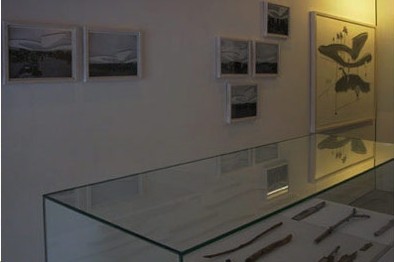David Maljkovic
18 Mar - 02 May 2009
DAVID MALJKOVIC
"After the Fair"
In his installations, videos and collages the Croatian artist David Maljkovic deals with the controversial history of his native country by exploring the modernist emnants of socialist Croatia as a part of Ex Yugoslavia and their echoes on the present, as well as their future possibilities. Reaching into the past, the artist turns to examples in which the ideas of universal modernist progress are interconnected with a specific understanding of socialism as a potentially radical, experimental, modernist concept.
Maljkovic’s first solo exhibition in Vienna is based on the research material about he EXAT 51 group and it refers to the Yugoslavian Pavilion at Vienna Fair, 1949. he Pavilion was designed by Vjenceslav Richter, Ivan Picelj and Aleksandar Srnec, all of them later became members of EXAT 51, short for Experimental atelier. The group was based in Zagreb and proposed to abolish the borders between high art and applied art, which apart from art also covered design, set design and xhibition pavilions for fairgrounds. In then dominate socialist realism surroundings they were trying to obtain legitimacy for abstract art and experimental and reative approaches to the work.
„After the Fair“ puts in focus the Yugoslavian Pavilion at the International Vienna air and recalls absent images of the pavilion and the absence of an euphoric rojection of a happier future which should be built after the recent historic trauma. The exhibition in its archtectonically determined space of the Georg Kargl BOX annot reconstruct these 'events', however it can bring up questions as a kind of an nventory making. The form from the Pavilion floats above Zagreb flea market, long lost companies on the branches, the empty shop window are just some of hem from the inventory list. „After the Fair“ confronts us with the heritage that is orgotten or not seen as a value for the present moment.
"After the Fair"
In his installations, videos and collages the Croatian artist David Maljkovic deals with the controversial history of his native country by exploring the modernist emnants of socialist Croatia as a part of Ex Yugoslavia and their echoes on the present, as well as their future possibilities. Reaching into the past, the artist turns to examples in which the ideas of universal modernist progress are interconnected with a specific understanding of socialism as a potentially radical, experimental, modernist concept.
Maljkovic’s first solo exhibition in Vienna is based on the research material about he EXAT 51 group and it refers to the Yugoslavian Pavilion at Vienna Fair, 1949. he Pavilion was designed by Vjenceslav Richter, Ivan Picelj and Aleksandar Srnec, all of them later became members of EXAT 51, short for Experimental atelier. The group was based in Zagreb and proposed to abolish the borders between high art and applied art, which apart from art also covered design, set design and xhibition pavilions for fairgrounds. In then dominate socialist realism surroundings they were trying to obtain legitimacy for abstract art and experimental and reative approaches to the work.
„After the Fair“ puts in focus the Yugoslavian Pavilion at the International Vienna air and recalls absent images of the pavilion and the absence of an euphoric rojection of a happier future which should be built after the recent historic trauma. The exhibition in its archtectonically determined space of the Georg Kargl BOX annot reconstruct these 'events', however it can bring up questions as a kind of an nventory making. The form from the Pavilion floats above Zagreb flea market, long lost companies on the branches, the empty shop window are just some of hem from the inventory list. „After the Fair“ confronts us with the heritage that is orgotten or not seen as a value for the present moment.

